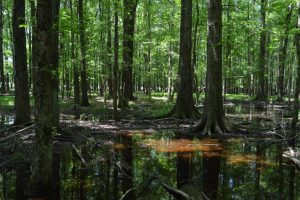
34,000 Acres of Wetlands Called “Delmarva Potholes” Would be Stripped of Federal Protections
Washington, D.C. – The Trump Administration’s proposed rollback of federal clean water regulations would undermine the Chesapeake Bay cleanup, in part by eliminating federal protections for at least 34,000 acres of wetlands and some headwater streams, according to a report by the Environmental Integrity Project.
“At a time when the effort to clean up the Chesapeake Bay is finally making progress, the Trump Administration is threatening to sink these achievements and endanger drinking water supplies across the region by weakening protections for streams and wetlands,” said Eric Schaeffer, Executive Director of the Environmental Integrity Project (EIP) and former Director of Civil Enforcement at EPA.
On Tuesday, EPA released proposed new regulations that would redefine what “Waters of the U.S.” should be protected by the federal Clean Water Act. Under the Trump Administration’s proposal, isolated wetlands not connected by surface waters to navigable waterways in an average year would be stripped of federal protections. This would make them more vulnerable to real estate development or pollution. Also left vulnerable would be streams that flow only after rain or snowmelt, called “ephemeral” streams.
The Environmental Integrity Project’s report, “Undermining Protections for Wetlands and Streams,” uses laser mapping data collected by federal researchers and University of Maryland scientists to show that there are 34,560 acres of scattered wetlands called “Delmarva Potholes” on the Delmarva peninsula that would be stripped of federal protections by the Trump Administration’s proposal.
That acreage is the equivalent of 54 square miles of green that provide vitally important filtration services by keeping farm runoff pollution out of the Chesapeake Bay. That’s a landmass almost the size of Washington, D.C. Delmarva Potholes also serve as a home for wildlife and a defense against flooding.
In the Chesapeake Bay region states, there are also 37,809 miles of intermittent or ephemeral streams – more than half of the total miles of waterways, often at the headwaters of rivers, according to EIP’s report, which is based on EPA figures.
The Trump Administration’s December 11 proposal leaves intermittent streams (meaning streams that flow every spring, for example, but not all year) as a protected category, but removes protections for ephemeral streams (those that flow only after rains or snowfall.) EIP’s report argues that this distinction between intermittent and ephemeral streams is likely to sow confusion and leave an unknown number of streams unprotected, even though they should be kept clean as a source of drinking water and as tributaries to the Chesapeake Bay.
“Clean water is essential for the health and sustainability of our families, communities and environment. Lest we forget — we all live downstream,” said Betsy Nicholas, Executive Director of Waterkeepers Chesapeake. “In the Chesapeake region, streams and tributaries in the upper reaches of the Susquehanna, Potomac, Shenandoah, James and many other rivers, as well as a huge number of wetlands, would not receive protections under the Trump administration’s heartless scheme to repeal the Clean Water Rule.”
The report also describes how “Delmarva Pothole” wetlands are a seldom-discussed but important natural resource for the Chesapeake Bay. State protections alone for scattered wetlands like them are not as strong as the combination of state and federal oversight, which the Trump Administration is proposing to roll back.
“Not many people have heard of the wetlands called ‘Delmarva Potholes,’ but they perform an important role by working in clusters to filter runoff pollution from the farms on the Eastern Shore.” Schaeffer said. “By undermining federal protection for wetlands and streams, we damage the bay’s vital organs – the natural filters that clean the water upon which life depends.”
The EIP report concludes by urging everyone who supports clean water and the Chesapeake Bay cleanup to write to EPA to object strongly to the Trump Administration’s “Waters of the U.S.” rule during the 60 day comment period.
The Environmental Integrity Project is a nonprofit, nonpartisan organization that empowers communities and protects public health and the environment by investigating polluters, holding them accountable under the law, and strengthening public policy.
Press contact: Tom Pelton, Environmental Integrity Project, (202) 888-2703 or tpelton@environmentalintegrity.og
###


